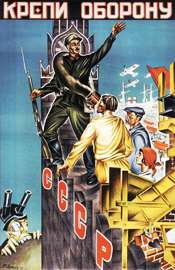Finally the time came to finish the high school. Where should I continue my studies?
I had a strong desire to go to Leningrad and enroll into Hertzen Teacher's College. But what would I live on? My father had repeatedly told me not to count on food parcels from them. This meant a hungry life was ahead of me again, the life of which I so much wanted to escape.
I shared these thoughts and doubts with our neighbor, who worked in a Klimovichi’s military registration and enlistment office.
It was that time, he gave me the advice which would define my entire life: "Join the military college, there you would never think of food and clothes. At this moment, we have an enlistment request from the Leningrad Military School of communication. Join it!”
So, I decided to enlist. There were five boys who left for Leningrad. Only two, including me, got accepted. This was in the summer of 1936.
Once I started my studies, it all seemed like a fantastic fairytale to me. I had my own clothes, my own bed, and most importantly, I was not hungry.
When I first arrived, I could not stop eating. I still remember my first meals- the first course was borscht, the second course was cutlet with porridge.
|

"Defend USSR!",
Soviet propaganda poster, 1927 |
Our drill-sergeant, I still remember his name, Makarevich, asked, "Who want’s more food?” I just sat and kept mum, as it was impolite to to ask for more. But my neighbors at the table shouted, "Here, here, Cadet Katz has had his plates empty for a long time.” The drill-sergeant then asked me, “How much more do you want?” I answered, “How much is possible?” He brought me an extra plate with four cutlets. I ate everything.
After three months my uniform collar no longer fit. Army regulations require for collars to always be clutched, therefore it was necessary to order a new shirt. However, a new shirt with a larger collar size was too big for me and the sleeves were too long.
There was a military tailor in our college but he worked only for the officers, not cadets. Luckily, the drill-sergeant sympathized with me and got the tailor help with my uniform.
This was partly because I was always on friendly terms with him and would volunteer for any physical task or request.
Regularly, he would call us up and ask, ”Who will volunteer to chop the firewood for the kitchen?" I would take a step forward, “Me!” For me, chopping the firewood was entertainment. I have chopped firewood since childhood. Or the drill sergeant would ask, “Who will volunteer to clear away the snow?” I would take a step forward again, “Me!”
At the college, I always had my clothes cleaned and ironed. In contrast, in my home village, I never even had my own clothes. I was usually provided with the worn, altered linen left over from my two elder brothers, Girsha and Faiva. That is why I fell in love with my brand new cadet uniform.
Similarly, my military boots were shined at all times. I was an excellent student, mostly because I believed that my good grades were the way to thank my teachers and commanders for my much better life.
But frankly, it was quite simple to excel. While other cadets were on Sunday and holiday breaks, I had nowhere to go. This led me to camp up in the library with my textbooks on electrical equipment, radio equipment and other technical disciplines.
I also excelled in my physical training. I was short, but physically very strong. This was largely because I started harrowing fields at the age of ten and was plowing fields with a horse by the age of twelve. For execution of such operations, iron hands were necessary. |